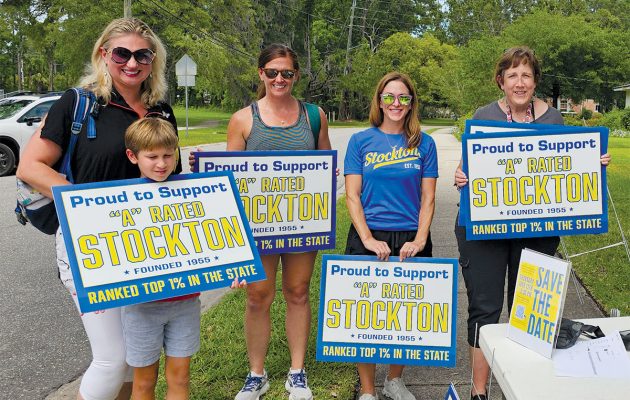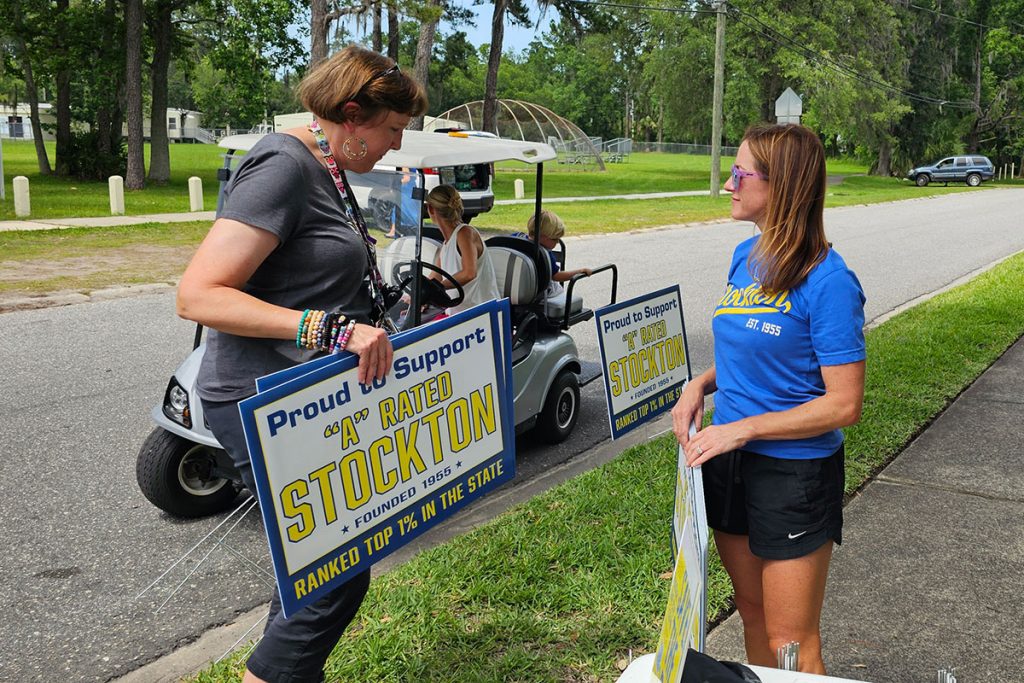Communities Rally to Save Neighborhood Schools
Posted on June 1, 2024 By Editor Top Stories

Ruth Jackl said the change she’s seen in her grandson in the weeks since he began attending John N.C. Stockton Elementary School has been “night and day.”
The family enrolled in the neighborhood elementary school in March of this year and Jackl said it would be a “tragedy” if the school should close.
“I don’t see how they could even contemplate it,” she said.
Jackl is just one of the many family and community members worried about the fate of the A-rated school after it was earmarked as one of the schools slated for potential closure in an updated Master Facility Plan (MFP) proposal presented to the Duval County Public Schools (DCPS) board earlier this year.
“Blueprints for Tomorrow: Strategic Adjustments for a Stronger Future” presented what DCPS Board Chair Darryl Willie said was a “very aggressive view on how to right-size a district if you were using certain parameters.”
This included adjusting the boundaries of the existing feeder patterns and proposing the closures and consolidations of several schools throughout the district. In our Resident communities, the proposed high school feeder patterns are the Riverside High School and Englewood High School patterns and the proposed closures include Bayview, Fishweir, Hyde Grove, John N.C. Stockton, Ortega and West Riverside elementary schools.
Under this current proposal, students from Stockton and Ortega elementary schools would be consolidated into Venetia Elementary School while Fishweir students would consolidate into Ruth N. Upson Elementary School, and West Riverside into Central Riverside.
“[Closing Stockton] would be a major detriment to our students and to our community,” said Stockton parent Lauren Agresti. “Eighty percent of this neighborhood attends Stockton and having to fold into Venetia, along with other schools…we will lose all of the things that make our school great.”
DCPS held its first public forum regarding the proposal at Fletcher High School on Tuesday, May 21, and was met with a full house and 138 public speaker cards. The formal meeting began at 6 p.m. and lasted more than three hours.
During the meeting, parents and community members asked questions and shared concerns regarding what they viewed as some of the primary issues leading to this proposal and the closures therein.
Forum Feedback
Board Member Cindy Pearson said the May public forum provided the school board with several topics of high concern for parents beyond wanting to save these neighborhood schools. It also, she said, solidified the fact that charters, private schools, virtual learning, home schooling or dedicated magnets are not the only options when it comes to school choice.
“I very much like now that parents are seeing their neighborhood schools as an intentional choice that they made, and I think that needs to get out more,” she said.
Pearson said she believes there’s still “confusion” regarding why some schools were slated for closures and others were not, and there is a larger conversation that still needs to be had surrounding a proposed closures list. The conversation about right-sizing and adjusting boundaries and feeder patterns has occurred, but that’s just “a portion of the conversation.”
“To me, it seems like we’ve had about a third of the conversation that we need to have with the other two being more clarity on the financial side and the facilities’ condition side, and the impacts of transportation. And also, do we have the right programs in the right places?” she said.
“We have not had an in-depth conversation on those other topics yet, so it’s difficult to think about, to really get a whole picture, without having that comprehensive conversation,” she added.
Transportation and the impact on traffic were hot topics at May’s event, as was bus transportation and other safe routes for students who are unable to take the bus. Parents voiced concerns regarding K-8 schools and the need to preserve special programs, should a consolidation take place.
Tracy Richter is the vice president of planning services for HPM and the consultant who put together the MFP proposal. During the public forum, he provided an overview of how the proposal was formulated and answered questions from the audience.
Parent Laura Garcia said she felt parents were less than impressed with some of his responses.
“The consultant answered a lot of questions that people had about the proposal, not in a way that I think parents would be happy about,” she said. “There was a very visceral reaction to things that he was explaining because they don’t align with our community.”
In a May 17 interview, Willie had expressed a hope that attendance for these forums would see a “critical mass” in these early conversations surrounding the proposal.
In an interview following the forum, he said the board “appreciated” May’s attendance.
“We appreciate everyone who came out and shared their thoughts, opinions, and even strategies on how we can move forward with this process and in the plan,” he said. “I think what it does is gives us an opportunity to attack the plan in different ways.”
Willie said the DCPS board is in the process of finalizing the matrix it will ultimately use to “make the final decision.” That matrix, he said, should be formulated “in the next couple of weeks.”
The feedback from the forum, Willie said, allowed the board to hear from the parents on the parameters they’d like to see on that matrix and to see some potential candidates for the focus groups planned for further discussions following these public forums. These focus groups will be comprised of School Advisory Council representatives along with board-selected individuals.
“We got to hear some folks that may be really good members of that focus group,” he said.

Charter Schools
The impact of charter schools on the DCPS landscape remains a top concern as they have had significant effects on both full-time enrollment (FTE) in, and funding allotted to, traditional neighborhood schools. According to DCPS, the number of charter schools in Duval County has increased nearly 35% over the last five years, from 32 in the 2019-20 school year to 43 in 2023-24.
DCPS Chief of Communications Tracy Pierce explained that school funding in the state of Florida “is directly tied to enrollment. The more students a district has, the more funding it receives.”
It is in the funding where charters have a primary impact on neighborhood schools.
Charter school enrollment has increased from fewer than 2,000 students in 2009 to more than 25,000 students today. The MFP breaks that enrollment down to 14,000 elementary-aged students; 7,300 middle school students and 4,400 high school students.
Pierce explained that both district and charter schools see capital funding (facility maintenance and improvement) from three sources: the half-penny sales tax, a local millage assessment and the Public Education Capital Outlay (PECO) Trust Fund.
A law passed during the 2020 legislative session required that, moving forward, revenue from the half-penny sales tax be shared with charter schools based on FTE. Pierce said currently, charters’ portion of that revenue is approximately 20%.
Charter schools are the sole recipients of PECO dollars. Pierce said “it has been at least five and possibly six or more years since [DCPS] received PECO.”
With several schools in his district slated for possible closure, District 7 City Councilmember Jimmy Peluso attended the public forum. In an interview following it, he said withholding those PECO dollars from traditional schools “really puts us at a disadvantage.”
“Had we had those monies available to us like we did – up until Tallahassee took it away from us – had we had those dollars available to us over the last several years, we probably wouldn’t be in the giant hole that we’re in right now,” he said.
There are currently no restrictions on where a charter school can be built in relation to a traditional neighborhood school, nor are there limitations to how many charters can exist within the boundary of a particular school district. While DCPS does not have the authority to close or consolidate a charter school, it can opt to not renew a charter school’s contract if certain circumstances apply.
Those circumstances, according to DCPS, are:
- “Failure to meet generally accepted standards of fiscal management due to deteriorating financial conditions or financial emergencies;
- “Failure to participate in the state’s school accountability system or meet the requirements for student performance (Charter schools that receive two consecutive school grades of ‘F’ are automatically closed per state law; Schools receiving three consecutive school grades below ‘C’ are required to choose from one of the turnaround options listed in state law. One of the options is voluntary closure);” and
- “Material violation of law.”
In the continued discussion surrounding school choice and charter schools, there are many who advocate in favor of choice and charter. Michael Hightower, who had been part of the committee advocating for the half-cent sales tax referendum, is a strong supporter of school choice for families.
“First and foremost, you know, education is about providing the greatest opportunity and that comes through competition, and it comes through choice,” he said. “Charters give parents choice. It’s not about whether one is right or wrong or anything like that. It’s just, competition in the education system is good and it provides parents, guardians the opportunity to try and find the best option and opportunities for our children.”
Patrick Tsakalakos, head of admissions and partnerships for Brilliant Microschools, said school choice affords parents the ability to find alternative education options for their children when other school structures aren’t meeting the children’s needs.
“Maybe a child who has lots of anxiety wouldn’t be able to experience in-person setups in a traditional sense,” he said. “So we try to build their confidence, potentially going through our school might mean them rejoining an in-person, public school, perhaps. So, we kind of act as a bridge.”
“The ability for families to have a choice is kind of pivotal and paramount in eventually being able to join our online school,” he added.
The next public forum will be at the DCPS administrative headquarters June 10 at 5:30 p.m. The Resident News will continue coverage of this issue as it develops. See additional forum times under DCPS Roundup, page 12.
By Michele Leivas
Resident Community News




 (1 votes, average: 5.00 out of 5)
(1 votes, average: 5.00 out of 5)Bayview Elementary, Central Riverside Elementary School, Cindy Pearson, Darryl Willie, DCPS, Duval County Public Schools, Englewood High School, Fishweir Elementary, Fletcher High School, Hyde Grove Elementary, Jimmy Peluso, John N.C. Stockton Elementary School, Laura Garcia, Master Facility Plan, Michael Hightower, Ortega Elementary School, Patrick Tsakalakos, PECO, Public Education Capital Outlay, Riverside High School, Ruth Jackl, Ruth N. Upson Elementary School, Tracy Pierce, Tracy Richter, Venetia Elementary School, West Riverside Elementary







